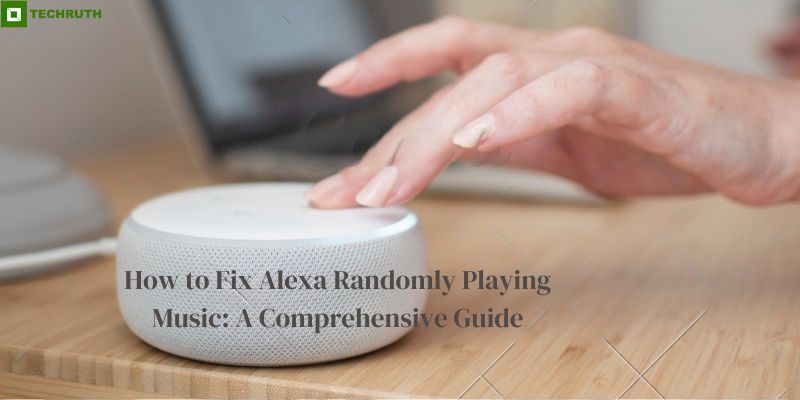Amazon’s Alexa has revolutionized the way we interact with our homes, making tasks as simple as commanding a virtual assistant. However, one occasional hiccup users face is Alexa randomly playing music without any prompt. This can be frustrating but fear not. In this guide, we will walk you through step-by-step solutions to fix this issue and restore the harmony of your smart home.
Reasons
Certainly! Here are some potential reasons for Alexa randomly playing music:-
Misinterpreted Voice Commands: Misunderstood or misinterpreted voice commands, background noise, or conversations could trigger Alexa to play music unexpectedly.
Unintended Triggers: Other individuals or devices inadvertently trigger Alexa’s music playback through voice commands or similar sounds.
Multiple Connected Devices: Having multiple Alexa-enabled devices in close proximity might cause cross-activation, leading to unexpected music playback.
Unusual Routines or Alarms: Irregular routines, alarms, or reminders set up in the Alexa app could unknowingly initiate music playback.
Voice Purchasing Enabled: If voice purchasing is enabled, misheard commands could trigger Alexa to play music while attempting to fulfill a purchase.
Background Noise: Elevated background noise levels in your environment might be falsely recognized as voice commands by Alexa.
Software Glitches: Software glitches or bugs within Alexa’s system could prompt the device to play music without any user input.
Methods to Fix Alexa Randomly Playing Music
Method 1: Check for Unwanted Triggers
Sometimes, unintended triggers can activate Alexa’s music playback. Ensure that no one else is sending voice commands and that you don’t have multiple devices connected. Also, verify that no voice-enabled toys or devices are nearby, as they might be inadvertently activating Alexa.
Method 2: Review Alexa App Settings
Open the Alexa app on your smartphone or tablet and navigate to ‘Settings.’ Under ‘Device Settings,’ select your Alexa device. Check if there are any unusual routines, alarms, or reminders that could trigger random music playback. Disable or modify these settings if necessary.
Method 3: Disable Voice Purchases
If you have voice purchasing enabled, it might be possible that a misunderstood command is leading to music playback. To disable this feature, open the Alexa app, go to ‘Settings,’ select ‘Account Settings,’ then ‘Voice Purchasing,’ and turn it off.
Method 4: Clear Voice History
Alexa learns from your voice history, and sometimes it might misinterpret background noise or conversations as commands. Clearing the voice history can help resolve this issue. In the Alexa app, go to ‘Settings,’ select ‘Alexa Privacy,’ then ‘Review Voice History.’ Delete any recordings that seem irrelevant.
Method 5: Check for Software Updates
Outdated software can sometimes cause unexpected behavior. Ensure your Alexa device’s firmware is up to date. Open the Alexa app, go to ‘Settings,’ select your device, and check for software updates.
Method 6: Reset Alexa to Factory Settings
If all else fails, consider resetting your Alexa device to its factory settings. Keep in mind that this will erase all personalized settings and require you to set up the device again from scratch. To reset, go to the Alexa app, navigate to ‘Settings,’ choose your device, and select ‘Factory Reset’.
Method 7: Contact Amazon Support
If the issue persists, it might be a technical problem beyond your control. Reach out to Amazon’s customer support for further assistance. They can provide specialized guidance and might offer a replacement if the device is faulty.
Conclusion
Alexa’s occasional quirk of randomly playing music can be frustrating, but with these steps, you can regain control over your smart home’s audio environment. Start with simple checks like unwanted triggers and app settings, then move on to more advanced solutions like software updates and factory resets if needed. By following this comprehensive guide, you will be well-equipped to troubleshoot and fix the issue of Alexa randomly playing music, restoring the seamless and enjoyable experience you expect from your smart assistant.
You may also like:
How to Fix Alexa Error Code 701? {5 Solutions}
Can’t Link Spotify To Alexa: 7 Methods To Fix It Easily
What can Alexa Do? A Complete Guide
FAQs
Q:- Why does Alexa randomly start playing music?
Ans:- Alexa might randomly start playing music due to misinterpreted voice commands, background noise, multiple connected devices, or even unusual routines or alarms set in the Alexa app. Check for these triggers and adjust settings accordingly to prevent unexpected music playback.
Q:- How do I stop Alexa from playing music randomly?
Ans:- To stop Alexa from randomly playing music, you can start by reviewing and disabling any unintended routines or alarms in the Alexa app. Additionally, consider clearing voice history, disabling voice purchases, and ensuring no background noise or voice-enabled devices are inadvertently triggering Alexa.
Q:- Can software updates fix Alexa’s random music playback issue?
Ans:- Yes, sometimes software updates can address glitches that lead to Alexa randomly playing music. Check your Alexa device’s firmware in the app’s settings and update it if available. This could potentially resolve any software-related causes of the issue.
Q:- Why does my Alexa device interpret unrelated sounds as commands for music playback?
Ans:- Alexa’s voice recognition algorithms might occasionally misinterpret background noise or unrelated sounds as voice commands, leading to unintended music playback. Clearing voice history, reviewing device placement, and reducing environmental noise can help minimize these instances.
Q:- If none of the solutions work, should I contact Amazon support?
Ans:- If you have exhausted all troubleshooting steps and the issue of Alexa randomly playing music persists, it’s a good idea to contact Amazon’s customer support. They can provide specialized assistance and guide you through advanced troubleshooting or potentially offer a replacement if the device is faulty.







